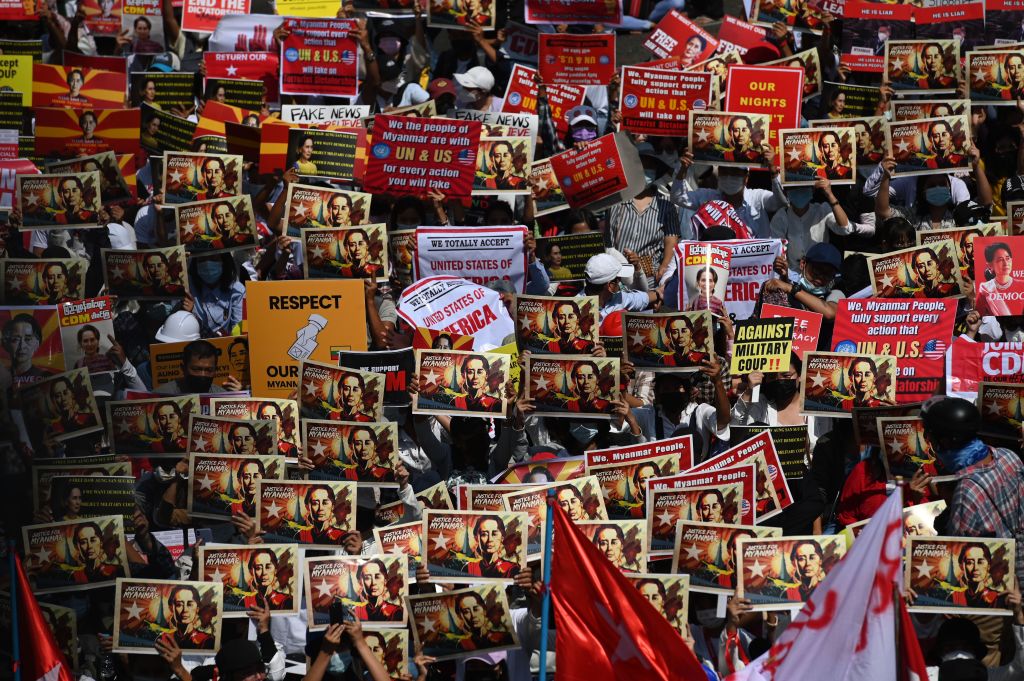
Myanmar’s military coup and the ensuing mass civil unrest have been presented as a litmus test of ASEAN centrality. Some observers have even portrayed the coup as ‘the most serious threat to the importance of ASEAN in regional diplomacy since the Cold War’.
Such an argument is curious on numerous grounds. Although individual states within ASEAN might care (or profess to care) about democracy, the organisation as a whole has always prioritised non-interference and respect for sovereignty. ASEAN has had little if anything to say in recent years about military coups in Thailand or substantial democratic backsliding in Malaysia, Indonesia and the Philippines.
Myanmar’s entry into ASEAN in 1997 occurred when the US’s democracy and human rights promotion efforts were at their zenith. At that time, and later when ASEAN was trying to deflect Western criticism by promulgating its own watered-down declaration on human rights, discussing Myanmar’s internal political character was fair game in a way that simply didn’t apply to other members. To the extent that ASEAN is trying to mildly pressure Myanmar’s ruling junta since February’s coup, such a dynamic has continued today. This doesn’t mean, however, that the upholding of democracy is a logical touchstone upon which to evaluate ASEAN centrality.
ASEAN’s centrality in the regional diplomatic architecture has rarely if ever been defined by the organisation’s ability to solve complex domestic political issues. Myanmar has always insisted that its various domestic peace processes are an internal affair. Accordingly, ASEAN has refrained from involving itself, despite—much like today—spillover effects impacting Thailand and close ASEAN partners India and China. ASEAN’s response to the Rohingya issue has never been praised for its efficacy.
This dynamic is in no way limited to Myanmar. ASEAN was not, for example, a particularly visible or key player in the Philippines’ efforts to break the siege of Marawi or in the negotiation and implementation of the Mindanao peace process. Nor was it a particularly important actor in the Aceh peace process.
There are exceptions, but they have occurred mostly in non-member states. Alongside Australia, ASEAN played a significant role in Cambodia’s 1992–93 political transition—before Phnom Penh joined the regional grouping in 1999. ASEAN also played an important, if not behind-the-scenes, role in Australia’s midwifery of Timor-Leste’s independence.
But, overall, ASEAN has failed to effectively respond to regional issues that appear to have far greater regional security implications than events in Myanmar.
Tensions over the South China Sea have often been characterised as the most likely source of a US–China conflict. Between China’s vast fishing fleets, militarisation of contested maritime waters and perceivably destabilising US freedom-of-navigation manoeuvres, ASEAN claimant states have had little control over broader dynamics there. Yet, largely because of China’s increasingly close relationship with Cambodia and Laos, ASEAN has often failed to achieve consensus on this crucial issue. Last year, ASEAN could only agree to a ‘muted and ambiguous’ statement.
Perhaps more important in terms of tangible everyday impacts is the issue of the long-term health of the Mekong River. China’s and to a lesser extent Laos’s damming of the upper reaches of the Mekong have exacerbated droughts and fragile ecologies in downstream countries. The result is that the livelihoods of at least 60 million people in Thailand, Vietnam, Cambodia and Laos itself are now under threat. Climate change will exacerbate these problems and is already driving internal migration and lower rice yields. Declining fisheries and agricultural output raise the possibility that distressed local communities will turn to other means of making a living such as drug trafficking. So far, ASEAN has failed to even respond at the basic level to this issue. Vietnam was intending to raise the issue during its chairmanship in 2020 but was side-tracked because of the pandemic.
Rather than in resolving issues that are at their core domestic, ASEAN’s traditional strength has lain in keeping the peace in a region beset by historical rivalries and ongoing territorial disputes. ASEAN’s muted response—or indeed lack of response—to the South China Sea and Mekong issues may ultimately prove to be a greater threat to its centrality than its silence on Myanmar’s domestic travails.

